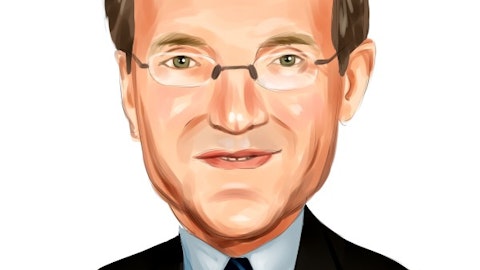Steve Tananbaum, the founder and manager of Goldentree Asset Management, recently sat down with Gary Kaminsky and Skybridge Capital founder and co-manager Anthony Scaramucci for an episode of Wall Street Week (video embedded at the end of the article). Tananbaum, who founded Goldentree in 2000, briefly described his upbringing and early career in finance, including revealing the first stock he ever lost money in, which was a company called Robotics Vision. Tananbaum also discussed his time at MacKay Shields, and before that, at Kidder, Peabody & Co. While at MacKay Shields, Tananbaum was quickly elevated to leading the firm’s high yield group in 1991, with great success.

We follow elite hedge funds like Goldentree Asset Management because our research has shown that their stock picks historically managed to generate alpha even though the filings are up to 45-days delayed. We used a 60-day delay in our back tests to be on the safe side and our research showed that the 15 most popular small-cap stocks among hedge funds outperformed the S&P 500 Total Return Index by an average of 95 basis points per month between 1999 and 2012. After adjusting for risk, our calculations revealed that these stocks’ monthly alpha was 80 basis points. We have also been sharing and tracking the performance of these stocks since the end of August 2012, during which time they have returned 118%, outperforming the S&P 500 ETF by over 60 percentage points (see more details here).
Follow Steven Tananbaum's GoldenTree Asset Management
Tananbaum was next asked to describe the unique partnership culture at Goldentree, which currently manages $24 billion in assets and had a public equity portfolio worth $447 million on June 30. As is apparent from the relatively small equity portfolio, the firm is primarily focused on the credit markets. We’ll look at some of Goldentree’s top equity picks later in the article, which it uses a bottom up value approach to select.
“So we’re a firm where…it’s unusual that we have 20 non-partners, and the majority of our partners are actually promoted from within, so it’s very much a meritocracy; it’s very much collegial. There are no special deals. In some places you’re paid off your group’s revenue, every partner is paid or is compensated from the top, on how the firm does,” Tananbaum said.
When asked why he decided to employ that model, Tananbaum said that it creates a culture where everyone is helping each other so that the firm and everyone in it succeeds. That certainly appears to have many benefits over a model that chiefly rewards individual performance.
Discussing the extreme volatility in the markets over the past two months, Tananbaum expressed that the markets don’t know how to digest all of the macro-economic factors in play and are not properly prioritizing issues such as the Fed’s interest rate hike (or lack thereof as it turned out), China’s slowing economy and the devaluation of the yuan, and the continuing instability in Greece. Tananbaum later added that the recent broad market selloff was most likely a bull market correction after the lengthy bull market run without one.





